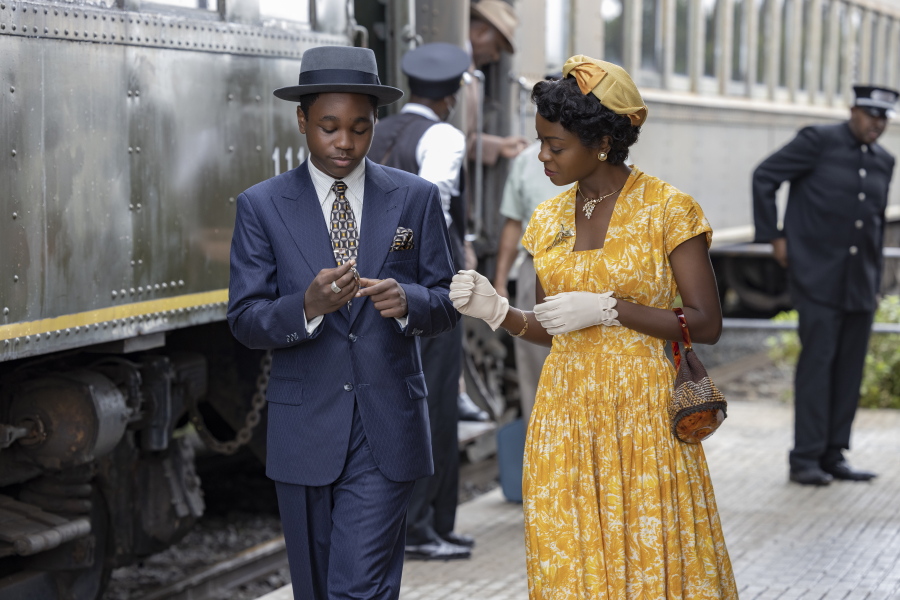Two white men were on trial in September 1955 for murdering Emmett Till, a 14-year-old Black teen who allegedly offended a white woman at a grocery store in rural Mississippi.
Near the end of the movie “Till,” now in theaters, grieving 33-year-old single mom Mamie Till-Mobley (then Mamie Till Bradley), played by Atlanta native Danielle Deadwyler, took the stand to tell the jury of 12 white men that the mutilated, bloated body found in a river was indeed her son.
Chinonye Chukwu, the film’s director and writer, was originally going to go for a traditional multicamera scene, cutting between the attorneys and Mamie. But after watching the first take of Deadwyler’s riveting performance, she changed her mind.
“The crew gave her a standing ovation,” Chukwu told The Atlanta Journal-Constitution last month.
So Chukwu framed the camera tightly on Deadwyler’s face for nearly seven consecutive minutes as her character answered questions. She explained why she knew this body was her son, about her emotional ties with her only child that only a mother could convey, about the basic brutality of what had happened to him. Deadwyler reveals variants of love and tenderness, then anger and pain, sometimes interweaving all those emotions together.
Deadwyler did six exhausting takes, all without a hitch.
“You don’t want to look away,” Chukwu said. “This is the moment we’ve built up to. As we get into cross examination and the questions get more and more intrusive and the justifications don’t let up, we visually see every emotion on her face.”
Chukwu said the audition process to find the right actress took months. “It was critical who was playing Mamie,” she said. “We needed someone who could command the screen and communicate a story with their eyes. Danielle did that times 100. I noticed it from her first audition tape. She can convey the emotional beats and subtext underneath the words on the page.”
Deadwyler, she said, spent months prepping before she even set foot on the set, making Chukwu’s life much easier: “She had an inherent understanding of Mamie’s emotional and psychological workings. Mamie had a full, incredible life with friends and community. She was a fully realized person. I was really excited to show those layers in the film.”
The film, which was shot in Atlanta in the fall of 2021, opens with Mamie as a single mom with a decent job living in Chicago, where discrimination was still rife but bearable. Her son Emmett is portrayed as a ray of light, a dancing, singing, fun-loving kid with no sense of hatred or resentment. Mamie’s mom (played by Whoopi Goldberg) convinces her to send Emmett down to see his cousins in Mississippi for the summer.
Mamie’s skepticism and fear for her son’s safety was founded very much in reality of what it was like to be Black in Mississippi during the Jim Crow era. When Emmett innocently compliments a white female shopkeeper, breaking an unspoken code between Black and white people, she had her husband and his half-brother beat, mutilate and shoot Emmett before dumping his body in a river.
Chukwu pointedly chose not to show the beatings on camera. But she shot Mamie seeing her son’s dead body for the first time, virtually unrecognizable. Chukwu made sure the movie score meshed with Mamie’s rising rage as she touched her son’s cold body and decided the entire world had to see this. She had media take pictures of him and held an open casket funeral that horrified millions and helped convert many to the side of racial justice at a time when the status quo was the easier default position for white Americans.
The film also shows Mamie’s growing awareness of the futility of the trial itself, that a jury of 12 white Southern men were not going to punish the two men, who later admitted to the crime, well aware they could not be imprisoned after the fact. But she also placed the mantle of justice on her shoulders to fight for civil rights for decades afterwards.
At a Harlem rally soon after the funeral in the movie, “there’s this feeling of hopefulness and empowerment,” Chukwu said. But Mamie also shows that her son will never be forgotten, that his light will always shine bright in her mind, that this love was unbreakable.



